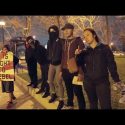Therapeutic Universities and Soft Despotism
The safe-space’s heart of darkness.
The phenomenon of rich, privileged “snowflake” college students demanding “safe spaces” from “microagressions” rightly provokes derision and scorn from normal people. Those who live among the slings and arrows of the real world, where actions have consequences and one’s delicate self-esteem is a matter of indifference, can only shake their heads at such childish tantrums. But the roots of this degradation of the university’s traditional mission to cultivate critical reasoning rather than narcissism run deep in our therapeutic culture, and threaten the virtues and qualities of mind necessary for self-rule and political freedom.
Start with the “self-esteem” fad that colonized the schools more than 25 years ago. In 1991 a widely publicized “study” proclaimed, in the words of a New York Times headline, “Gender Bias in Schools Is Still Short-Changing Girls.” Because of the “unconscious bias” of teachers, the tale went, grade-school girls are wounded in their self-esteem and thus rendered incapable of excelling in traditional male-dominated disciplines like science and math. Though the study’s methodology and conclusions were quickly discredited, it went on to provide intellectual support for the $600 million Gender Equity in Education Act of 1993. It also encouraged the more expansive application of Title IX of the 1972 Educational Amendment Act, which threatened the cut-off of federal money to colleges in order to coerce them into policing “discrimination” on the “basis of sex.”
This is just one example of how left-wing identity politics, in this case feminism, generated phony “research” that gave a patina of science to contested and dubious ideology, which then became enshrined in federal law. Today, the abuse of Title IX drives the administrative infrastructure of universities that caters to selected victim-groups, creates unconstitutional inquisitions that investigate and punish allegations of “sexual assault,” and shuts-down free speech by conservatives. After all, we mustn’t let wounded self-esteem damage the prospects of women and minorities already victimized by the “patriarchy” and “racism.”
So it’s not just the left-wing ideology that corrupts universities. Intellectual development and training have been replaced by an obsession with students’ feelings. How students feel is now more important than how well they think.
Indeed, over the years universities have developed numerous services for students that monitor their psychological health and offer therapeutic solace. For example, I just received an email from my campus of the California State University system, the largest in the U.S. with half a million students and 23 campuses. The email came from the Campus Assessment, Response, and Evaluation outfit, its acronym CARE revealing its therapeutic thrust. This “collaborative effort” uses a “community approach” to help professors identify “students who are facing significant personal struggles, in distress, or students of concern” and direct them to the appropriate services. These services include free counseling; “Let’s Talk,” a drop-in venue for therapeutic intervention; and a licensed clinical social worker available by appointment at no cost. We professors are supposed to monitor our students for “signs of stress” and then alert them to these services.
What has any of this to do with higher education? What business is it of the university to monitor the psychological well-being of legal adults? Partly schools are engaging in preemptively protecting themselves from liability or a federal investigation. If a depressed student commits suicide in a dorm, the existence of these services and programs for depressed students can offer protection from being sued. The university administrative apparatus also benefits from the expansion of its offices and services, and the added resources and manpower they require. This need to service students’ psychological health has contributed to the expensive administrative bloat in higher education, which has led to fewer full-time professors, more exploited adjuncts, and higher tuition costs.
Identity politics programs also find such offices to be useful allies for reinforcing their ideological agendas. Identity politics is predicated on victimhood, and victimhood generates demands for compensatory programs and services.
Minority students and women presumably are being psychologically wounded by racism and sexism, and thus should have services that apply therapeutic balm to their psychic wounds. Given the rarity these days of legal or violent expressions of sexism or racism, victims must look to psychological effects like “low self-esteem” or subjective perceptions of “microagressions” as evidence of “unconscious racism” and other occult biases. The therapeutic services offered by the university validate this victim narrative, as do sexual harassment policies, “hate speech” codes, and other policies all backed up by badly written federal and state laws. They all assume the therapeutic imperative to protect students from damage to their self-esteem.
More generally, this therapeutic infrastructure infantilizes students, and contributes to the dumbing down of university standards of admissions and evaluation, lest students suffer even more trauma from poor academic performance, flunking courses, or dropping out. Thus apart from the hard sciences, most college curricula today are the equivalent of high school courses fifty years ago, and in some cases are not even up to that standard. The obsession with “hurtful” speech similarly assumes a child-like sensibility that must be cossetted and protected in order to avoid psychological damage. In the case of black students, this attitude is particularly patronizing and insulting. College students whose ancestors survived everyday racist slurs and lethal violence now must be protected from subjective slights often invisible to most other people. And universities tolerate and even enable the violent tantrums thrown by those who have been led to expect the whole world to respect their tender sensibilities and inflated perceptions of themselves and their political beliefs.
Hence the sorry state of higher education in America. Legal adults who can join the military and vote, who drink and fornicate, who drive cars watch porn, are treated like preschoolers who need hand-holding and constant guidance from bureaucratic nannies. Standards of admission are lowered and grade inflation runs rampant so that privileged victim-groups aren’t slighted and their self-esteem damaged by hidden racism and sexism. The administrative bureaucracy waxes ever fatter, even as the number of full-time professors diminishes and tuition costs soar. And the tax-payer is on the hook for much of the bill, as the federal government now backstops the over $1 trillion in student debt, billions of it unlikely ever to be repaid.
Worst of all, the university’s mission has been degraded. The traditional imperatives to teach critical thinking, foster the ability to make a coherent, evidence-based argument, help students achieve intellectual independence and autonomy, and familiarize them with the foundations of our political order and civilization–– all are discarded and replaced with a combination of vocational school, political reeducation camp, and social welfare agency. The therapeutic obsession with feelings displaces the rigorous intellectual training that is often uncomfortable and humbling. Developing the mind is like developing the body: progress comes through overcoming resistance, not wallowing in safety and comfort. Finally, fast disappearing are the enlightening experience of stimulating, free-wheeling, and vigorous debate, and the exposure to a wide diversity of ideas that challenge and make students argue for and defend their own ideas. Isn’t that the whole point of academic freedom?
Gone, then, are the important traditional benefits of higher education aimed at creating independent minds worthy of political freedom. Now a mind-numbing conformity and intolerant orthodoxy permeate most courses, and political correctness is the spectral commissar that polices the classroom to inhibit speech and proscribe alternative ideas. This ideological corruption is the product not just of politicized professors, but of unexamined bad ideas like “self-esteem” that empower (and profit) some at the expense of others. Combine these ideas with federal laws and regulations that can investigate and punish universities, and you get the infantilizing conformity factories that are today’s colleges and universities.
Finally, such institutions of higher learning are perfect for manufacturing Tocqueville’s “soft despotism,” which seeks “to keep [the people] in perpetual childhood,” is “well content that the people should rejoice, provided they think of nothing but rejoicing,” and desires “to spare them all the care of thinking.” People, in other words, fit for being wards of the redistributionist leviathan state, but not for governing themselves. And as Tocqueville warns us, “men who have entirely given up the habit of self-government” cannot “succeed in making a proper choice of those by whom they are to be governed; and no one will ever believe that a liberal [i.e. committed to individual freedom], wise, and energetic government can spring from the suffrages of a subservient people.”
Bad ideas make bad schools, bad schools make bad citizens, bad citizens make bad laws, bad laws make bad government. That’s the recipe for tyranny.





